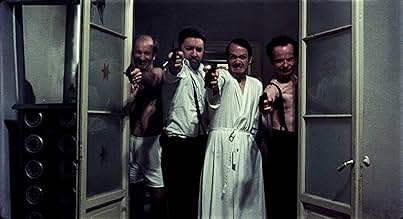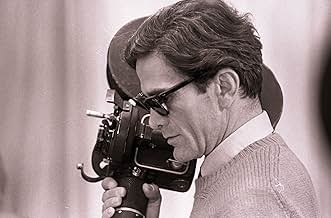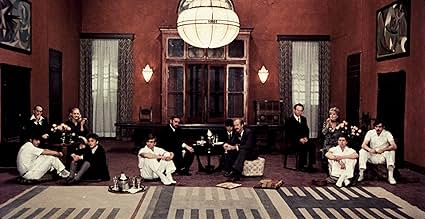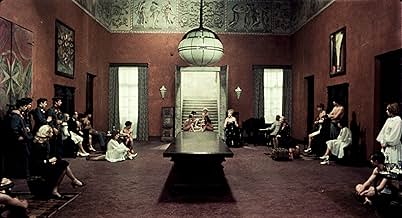
Play clip3:12
Watch If You Liked Terrifier 3, Watchlist These Endurance Horror Classics
In World War II Italy, four fascist libertines round up nine adolescent boys and girls and subject them to 120 days of torture.In World War II Italy, four fascist libertines round up nine adolescent boys and girls and subject them to 120 days of torture.In World War II Italy, four fascist libertines round up nine adolescent boys and girls and subject them to 120 days of torture.
- Awards
- 2 wins total
Uberto Paolo Quintavalle
- Eccellenza
- (as Umberto P. Quintavalle)
Hélène Surgère
- Signora Vaccari
- (as Helene Surgere)
Summary
Reviewers say 'Salò, or the 120 Days of Sodom' is a controversial film exploring power, corruption, and depravity. Based on de Sade's work, it depicts extreme abuse by fascists. Many find it disturbing yet artistically significant, while others criticize its graphic content and slow pace. Its examination of fascism and power abuse is noted, sparking debates on its artistic and moral value.
Featured reviews
Pasolini made it quite clear in several texts that this is not an anti-fascist film, but rather that fascism is a symbol for something far more pervasive. He ultimately saw himself as a committed director, and thus all of his historical films are about the present, and this film was made in the 70's, not in the 40's. It is rather an anti-bourgeois film. (Pasolini's political enemies at the time were not fascists at all, but the Christian Democrats)...Furthermore it is NOT a defense of Sade, but an apology for his earlier writings and films which mythicized acts of violence and glorified them as the pure, unconscious, pre-verbal expression of the subproletariat. However Pasolini saw the riots of the bourgeois students in 1968 as nihilistic acts of revolt, not revolution--a revolt of the Bourgeoise against itself, as his poetry makes clear. He watched in horror as he saw his vision of true revolution twisted into a childish and merely destructive tantrum against the previous generation. And so it is the Bourgeoise, symbolized by Fascism, which he represents and condemns in Salo, in the guise of what he considered to be a medieval morality play. And it is in this context that he apologizes for having made statements like "Only a bloodbath can save the world" (1962), which is quoted in the film. Yet, like everything else, it has been appropriated by the bourgeoise, who misinterpret it first as Nietzsche, then as St. Paul, until it gets reduced to a merely absurdist Dada interpretation. The characters are continually misinterpreting the many structuralist citations, because they have no history. History has been destroyed, and thus Pasolini is trying to re-introduce it in the film. The revolution, by 1968, was impossible, as there was nobody left to fight it. The bourgeoise, Pasolini lamented, had subsumed everything into itself-there was no "other", only a technological god-like and all-inclusive power structure. But what is most shocking is that it is the Sadean libertarianism and the permissivness of that class that Pasolini finds most disturbing. He held that the permissiveness of the "anarchy of power" was more tyrannical than repression. He was most traumitized, oddly, by the increasing tolerance of homosexuals. And so truely Pasolini takes the side of Dante, not Sade. And finally, its ultimately a film about misinterpretation. What the characters say and what they do (as in Sade) are incongruent. He knew that he was to be misunderstood by his Bourgeois audience, as it misunderstood itself, Pasolini said that it was intrinsic that Salo remain enigmatic (on the model of Dante), and this is the film's real genius. Judging by most of these reviews, Pasolini made his point.
Reportedly, when the executives of one, now defunct, American film company saw "Saló", which they helped co-finance and had distribution rights on, they were so disturbed and embarrassed that they didn't know what to do. Are we going to release this thing? With our company name on it? Where?
They had to show that they released it somewhere in the U.S. or territories.
So they did. In a small theater in El Condado area near San Juan, Puerto Rico.
There's where I saw it. In the mid-70's. With the film company's name on it.
Is it any good? Well, I'm no great admirer of Pasolini. Frankly, I find his movies intolerable. And "Saló" is no exception. But, unlike his Trilogy of Life ("The Decameron", "Canterbury Tales", "Arabian Nights") where he at least displayed some flair and humor, this one is a different animal.
His style was always somewhat ponderous. In "Saló" it is heavily, oppressively didactic: static tableaux-style framing, a deliberately slow pace, no humor whatsoever, and actors who don't play characters but conceits. Although Pasolini uses De Sade's "120 Days of Sodom" as scaffolding and as a pointed commentary, "Saló" is actually based on real events that happened in the Republic of Saló in Northern Italy, where a group of wealthy fascists abducted a large group of young men and women, went on to debase them, and after they were done with them they killed them. Pasolini staged all the scenes as demonstrations of degradation and cruelty. And he does not flinch.
At the end he includes a bibliography.
It's an unpleasant experience.
Clearly, Pasolini, an award-winning poet and one of the leading intellectuals of his time, was very angry when he did this moving picture. He wanted to send a message to Italy and to the world.
It was his last film.
Months later he was murdered.
After several weeks of being in release, the theater was raided by our local vice authorities.
They had to show that they released it somewhere in the U.S. or territories.
So they did. In a small theater in El Condado area near San Juan, Puerto Rico.
There's where I saw it. In the mid-70's. With the film company's name on it.
Is it any good? Well, I'm no great admirer of Pasolini. Frankly, I find his movies intolerable. And "Saló" is no exception. But, unlike his Trilogy of Life ("The Decameron", "Canterbury Tales", "Arabian Nights") where he at least displayed some flair and humor, this one is a different animal.
His style was always somewhat ponderous. In "Saló" it is heavily, oppressively didactic: static tableaux-style framing, a deliberately slow pace, no humor whatsoever, and actors who don't play characters but conceits. Although Pasolini uses De Sade's "120 Days of Sodom" as scaffolding and as a pointed commentary, "Saló" is actually based on real events that happened in the Republic of Saló in Northern Italy, where a group of wealthy fascists abducted a large group of young men and women, went on to debase them, and after they were done with them they killed them. Pasolini staged all the scenes as demonstrations of degradation and cruelty. And he does not flinch.
At the end he includes a bibliography.
It's an unpleasant experience.
Clearly, Pasolini, an award-winning poet and one of the leading intellectuals of his time, was very angry when he did this moving picture. He wanted to send a message to Italy and to the world.
It was his last film.
Months later he was murdered.
After several weeks of being in release, the theater was raided by our local vice authorities.
"Salo: The 120 Days of Sodom" (1975): Be prepared for one of the roughest films you'll ever see. This was Pasolini's last, and going by what I've seen, his vision only became bleaker and more disturbed as the years clawed along. Using the Marquis de Sade's ideas on the decadence of 18th century France, Pasolini represents Fascist Italy (1944-45). We are shown the upper class always removed and protected from the outer world as predators of the poor, weak, young, and less educated. A group of wealthy adults shop amongst the kidnapped older children of bourgeoisie. They choose eighteen, and steal them away to a hidden mansion, where there is no escape. There, the adults live out every twisted fantasy they've ever had or can now muster, while demeaning, raping, and torturing the youngsters. The teens react in many ways, none of which are "pretty". This entire film experience MUST be viewed as a symbolic, emotional "explanation" of what it was like to live under Nazi/Fascist rule (in this case), and how an otherwise normal, decent society could be turned into lunatics and sub-animals. Although made 30 years ago (with the usual weaker production qualities of that era), I cannot think of another work which so blatantly and painfully illustrates what those in power are capable of doing when boredom gives rein to impulse. In comparison, "Lord of the Flies" barely lights upon these issues, "Pink Flamingos" was but a tiny, kitschy springboard, and "Schindler's List" described a much narrower range of degradation. To this day, "Salo:
" is banned in some countries. This is NOT a film about acting, lighting, sound, camera work, etc.. This is a film about states of mind theirs then, ours now. P.S.: If you are interested in set design, this one is FILLED with original Cubist/Bauhaus/Futurist/Moderne furnishings, murals, and art. Spectacular. Those styles were not yet being reproduced, so Pasolini used the real thing. There is also an interesting use of a Charles Rennie MacIntosh chair
which will alter how you see this design from here on out.
Pier Paolo Pasolini, as is well known, was murdered not long after he finished work on this, his most audacious and confrontational film, yet even the most casual viewing of SALO begs the question - had he not been murdered, would he have taken his own life anyway? Every sequence, every shot and practically every moment of this film is so burdened with despair, barely concealed rage and a towering disgust with the human race, one gets the impression that Pasolini was barely hanging onto life - and any attendant shreds of hope - by his fingernails. Although ostensibly an adaptation of one of DeSade's most depraved works channeled through the horrifying excesses of the Second World War with the Fascist ruling classes as its (authentically vile) villains, SALO also contains a lot of contemporary criticism - Pasolini hated the modern world, and explained the stomach-churning 'banquet of s**t' as a none-too-subtle attack on the encroaching global domination of the fast food chains. (The scenes of sexual excess can similarly be read as a despairing attack on the permissive society - those who come to SALO expecting titillation or B-movie sleaze will be sorely disappointed.) Beyond the nihilistic content, which has been well documented elsewhere, the film has an overall mood that seems to have been engineered to make the viewer thoroughly depressed. Shot on washed-out, faded film stock using primarily static cameras, long shots, choppy editing and very few cutaways, SALO has a visual style reminiscent of cinema-verite documentary. Add to this the unnerving use of big band music, piano dirges and the (intentionally?) scrappy post-dubbed dialogue, and the distancing effect on the viewer is complete. SALO comes across as one long primal scream of rage, designed to shake the viewer out of his complacency, and in this respect, the film succeeds unequivocally. Whether or not you would care to watch this more than once, or indeed for 'entertainment', is another matter, but SALO is an important film that demands a careful viewing ONLY by those prepared for it.
This is on the list of most disturbing movies ever. But it's not disturbing for the sake of it. There is an underlying exposition of a fascist government and it's ability to control to the most depraved extremes. I don't need to go into the plot, just don't watch if your skin crawls easily.
Apparently based loosely on the Marquis de Sade's eponymous story, it feels dirty...it feels icky. You will not finish the film feeling happy, relieved, redeemed, or satisfied. You will feel that humanity is capable of terrible things and sometimes for no real reason other than they can. It shows what happens when people blindly follow terrible people and abandoned their own sense of decency. The following orders defense will never work. When you've become an accomplice you ate equally guilty.
This movie has depth, but it's not an easy watch. It's not for a simple eve with a date. I can't imagine watching this with anyone other than fellow film students or a significant other you've been with for years.
Apparently based loosely on the Marquis de Sade's eponymous story, it feels dirty...it feels icky. You will not finish the film feeling happy, relieved, redeemed, or satisfied. You will feel that humanity is capable of terrible things and sometimes for no real reason other than they can. It shows what happens when people blindly follow terrible people and abandoned their own sense of decency. The following orders defense will never work. When you've become an accomplice you ate equally guilty.
This movie has depth, but it's not an easy watch. It's not for a simple eve with a date. I can't imagine watching this with anyone other than fellow film students or a significant other you've been with for years.
Did you know
- TriviaDespite the grim subject throughout the film, in an interview on the second disc of the Criterion Collection box set, actress Hélène Surgère claimed the mood was actually rather jovial on the set and that none of the teenage actors were actually harmed or traumatized. She said the abundance of teenagers who had never acted before led the mood to be happy and at times, even fun, with the cast often playing practical jokes on each other. She also said that the movie was literally "made" in the editing room and the filmmakers had no idea how grim a movie it was until they saw the finished product at the premiere.
- GoofsWhen the Duke kisses several victims during Sergio and Renata's wedding, some victims and Ezio begin to laugh, off the character.
- Quotes
The President: [while eating a meal of feces] Carlo, do this with your fingers.
[the President sticks two fingers in his mouth]
The President: And say, "I can't eat rice with my fingers like this."
Male Victim: [with fingers in his mouth] I can't eat rice.
The President: Then eat shit, you little bastard.
- Crazy creditsEssential Bibliography: Roland Barthes: 'Sade, Fourier, Loyola' (Editions du Seuil); Maurice Blanchot: "Lautréamont et Sade' (Editions de Minuit; in Italy Dedalo Libri); Simone de Beauvoir: 'Faut-il brûler Sade' (Editions Gaimard); Pierre Klossowski: 'Sade mon prochain, le philosophe scélérat' (Editions du Seuil; in Italy SugarCo Edizioni); Philippe Sollers: 'L'écriture et l'experience des limites' (Editions du Seuil)
- Alternate versionsThe film was rejected for cinema by the BBFC in 1976 and a private showing of the uncut version at the Old Compton Cinema Club in London's Soho resulted in a police raid and confiscation of the movie. A heavily edited version - minus 6 minutes of footage including scenes of torture, homosexuality and excrement eating, and including a 4 minute prologue describing the history of the town of Salo - was later prepared by UK censor James Ferman for club showings. The film was finally passed completely uncut for cinema and video in the UK in December 2000.
- ConnectionsEdited into Histoire(s) du cinéma: Une histoire seule (1989)
- SoundtracksPrelude in C minor
(uncredited)
Composed by Frédéric Chopin (uncredited)
Played by Arnaldo Graziosi (uncredited)
- How long is Salò, or the 120 Days of Sodom?Powered by Alexa
- How was it possible to shoot this movie with kids?
- What was the entire meaning of this film?
- Did anything in this movie happen in real life?
Details
- Release date
- Countries of origin
- Languages
- Also known as
- Saló o los 120 días de Sodoma
- Filming locations
- Production companies
- See more company credits at IMDbPro
Box office
- Gross worldwide
- $1,808,595
- Runtime1 hour 57 minutes
- Sound mix
- Aspect ratio
- 1.85 : 1
Contribute to this page
Suggest an edit or add missing content


![Trailer [OV]](https://m.media-amazon.com/images/M/MV5BYTczYWExODUtNmQ3NC00MzRhLTkwMGQtNzRjM2M5ZGQzYmVkXkEyXkFqcGdeQXRyYW5zY29kZS13b3JrZmxvdw@@._V1_QL75_UX500_CR0)

























